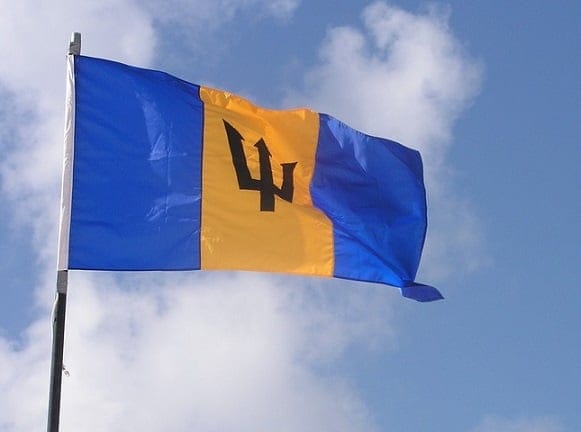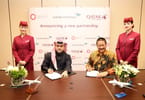The prince shared the limelight with the star of the show, Rihanna, the Barbados-born singer and entrepreneur who is a wildly popular local icon. She received a National Hero title from Prime Minister Mia Amor Mottley, under whose leadership Barbados took the final step away from the crown despite calls for a referendum.
In a national election on Jan. 19, called 18 months before the end of her first term in office, Mottley, the first woman to be prime minister of Barbados, led her Barbados Labor Party to a second, shutout win for a five-year term in the House of Assembly, the lower chamber in the Barbadian Parliament. The vote was decisive: her party captured all 30 seats, though some races were tough.
“The people of this nation have spoken with one voice, decisively, unanimously and clearly,” she said in her celebratory speech before dawn on January 20. Outside her party headquarters, her jubilant supporters — masked, as is everyone in public spaces in Barbados — wore red T-shirts that read, “Stay safe with Mia.”
The world will be hearing more from her. A rumor that she has been approached by UN Secretary-General António Guterres to take on a global advisory role on his behalf was denied by Mottley’s office, which said that the prime minister “is unaware of any development that would fit within the context of the rumor about which you have enquired.”
Barbados is not the first former British colony to lower the royal flag, ending the monarchy’s role, now mostly ceremonial, of appointing the governor-general of a former colony. Barbados became independent in 1966 after centuries of colonial rule. Until now, it had retained its royal connection.
This is a time, however, when demands for a new round of redefining and finally eradicating the remnants of colonization are gaining traction in developing countries. Mottley, 56, is a champion for the cause, as she explores the untapped potential in developing stronger ties with Africa.
Globally, the “decolonization” of medical research and public health, for example, is an issue that has intensified in the Covid pandemic. At the same time, calls for the “decolonization” of international affairs demands that global policy decisions should not be the prerogative of big powers.
In a virtual conference of several African and Caribbean leaders in September, Mottley applied the decolonization principle to the reawakening and strengthening of a trans-Atlantic culture to help overcome the corrosive legacy of slavery.
“We know that this is our future. This is where we know we have to carry our people,” she said. “Your continent [Africa] is our ancestral home and we are related to you in so many ways because Africa is around us and in us. We are not simply from Africa.
“I ask us to recognize that the first thing that we must do, above all else . . . is to save ourselves from mental slavery — the mental slavery that has us seeing North only; the mental slavery that has us trading North only; the mental slavery that has us not recognizing that between ourselves we constitute one-third of the nations of the world; the mental slavery that has prevented direct trade links or direct air transport between Africa and the Caribbean; the mental slavery that has blocked us from reclaiming our Atlantic destiny, formed in our image and the interests of our people.”
Descendants of African slaves, she said, should be able to visit countries on both sides of the Atlantic and renew shared cultural traits, down to foods they enjoy. “Caribbean people want to see Africa, and African people need to see the Caribbean,” she said. “We need to be able to work together, not in the interests of a colonial civil service or because people brought us here against our will. We need to do it as a matter of choice, as a matter of economic destiny.”
In her 2021 Christmas Day message to Barbadians, Mottley was more expansive, seeking a global role for the small nation already “punching above its weight.”
Barbados ranks near the top in human development in the large Latin American-Caribbean region, a positive environment for women and girls. With some exceptions — Haiti stands out for its tragic failures — the Caribbean region has a good record.
In 2020, the United Nations Development Program’s Human Development Report (based on 2019 data) calculated that female life expectancy at birth in Barbados was 80.5 years, compared with 78.7 for women across the region. In Barbados, girls could expect up to 17 years of available education from early childhood through the tertiary level, compared with 15 years regionally. The Barbadian adult literacy rate is over 99 percent, a pillar of sustained democracy.
Looking outward since taking office in 2018 for the first time in a landslide election victory for her center-left Barbados Labor Party, Mottley has established a strong personal international profile. Her sharply challenging address to the UN General Assembly in September and acerbic criticisms of global climate discussions (see video below) have attracted attention for her robust frankness and ability to rouse the audience. Yet she is leader of a country about a quarter the physical size of metropolitan London, with a population of about 300,000, comparable to that of the Bahamas.
“We end this year, 2021, having broken the last institutional vestiges of our colonial past, bringing to an end a form of governance that lasted for 396 years,” she said in her Christmas message to the nation. “We have declared ourselves a Parliamentary Republic, accepting full responsibility for our destiny and above all else, installing the first Barbadian Head of State in our history.” Sandra Prunella Mason, the former governor-general, a Barbadian lawyer, was sworn in on Nov. 30 as the republic’s first president.
“We move forward, my friends, with confidence,” Mottley said in her message. “This I believe is testimony to our maturity as a people and as an island nation. Now, we are at the doors of 2022. We are determined to resume the journey towards Barbados becoming world class by 2027.”
It is a tall order.
The Barbadian economy was set back by the loss during the pandemic of crucial earnings from its predominately high-end tourism, but the prime minister says travelers are beginning to trickle back. The Central Bank of Barbados predicts that tourism will recover fully by 2023.
Mottley is at ease on a big stage. She has lived in London and New York City, holds a law degree from the London School of Economics (with an emphasis on advocacy) and is a barrister of the bar in England and Wales.
The early history of Barbados under British rule is steeped in centuries of exploitation and misery. Not long after the first white landowners began to arrive in the 1620s, driving Indigenous people off their land, the island became a hub of the African slave trade in the Western Hemisphere. Britain soon dominated trans-Atlantic trafficking and built a new, prosperous national economy for the British elite on the backs of Africans.
British plantation owners had learned from the Portuguese and Spanish, who had introduced slave labor on their colonial properties in the1500s, how profitable the system was with free labor. In the sugar plantations of Barbados, it was used on an industrial scale. Over the years, hundreds of thousands of Africans were no more than chattel, deprived of rights under harsh racist laws. Slavery was abolished in the British empire in 1834. (It was abolished in all the northern American states between 1774 and 1804, but not in the South until 1865.)
The story of slavery in Barbados is told in a 2017 book based on scholarly research laced with searing portrayals of Afro-Caribbean life: “The First Black Slave Society: Britain’s ‘Barbarity Time’ in Barbados 1636-1876.” The author, Hilary Beckles, a Barbados-born historian, is vice chancellor of the University of the West Indies, which published the book.
Beckles has been a leading proponent of reparations for slavery who regularly excoriates the British elite, London financiers and the institutions they created from profits of slavery. The British establishment not only failed to make amends, he argues, but also never told the truth to the British people about the horror of Afro-Caribbean life.
Prince Charles, in his Nov. 30 speech on the handover of the last vestige of royal power to the new republic, made only a passing reference to the centuries-long suffering of African slaves and focused instead on an upbeat future for the British-Barbados relationship.
“From the darkest days of our past, and the appalling atrocity of slavery, which forever stains our history, the people of this island forged their path with extraordinary fortitude,” he said. “Emancipation, self-government and independence were your way-points. Freedom, justice and self-determination have been your guides. Your long journey has brought you to this moment, not as your destination, but as a vantage point from which to survey a new horizon.”
First issued by Barbara Crossette, senior consulting editor and writer for PassBlue and the United Nations correspondent for The Nation.
#barbados
WHAT TO TAKE AWAY FROM THIS ARTICLE:
- 19, called 18 months before the end of her first term in office, Mottley, the first woman to be prime minister of Barbados, led her Barbados Labor Party to a second, shutout win for a five-year term in the House of Assembly, the lower chamber in the Barbadian Parliament.
- In a virtual conference of several African and Caribbean leaders in September, Mottley applied the decolonization principle to the reawakening and strengthening of a trans-Atlantic culture to help overcome the corrosive legacy of slavery.
- A rumor that she has been approached by UN Secretary-General António Guterres to take on a global advisory role on his behalf was denied by Mottley's office, which said that the prime minister “is unaware of any development that would fit within the context of the rumor about which you have enquired.























